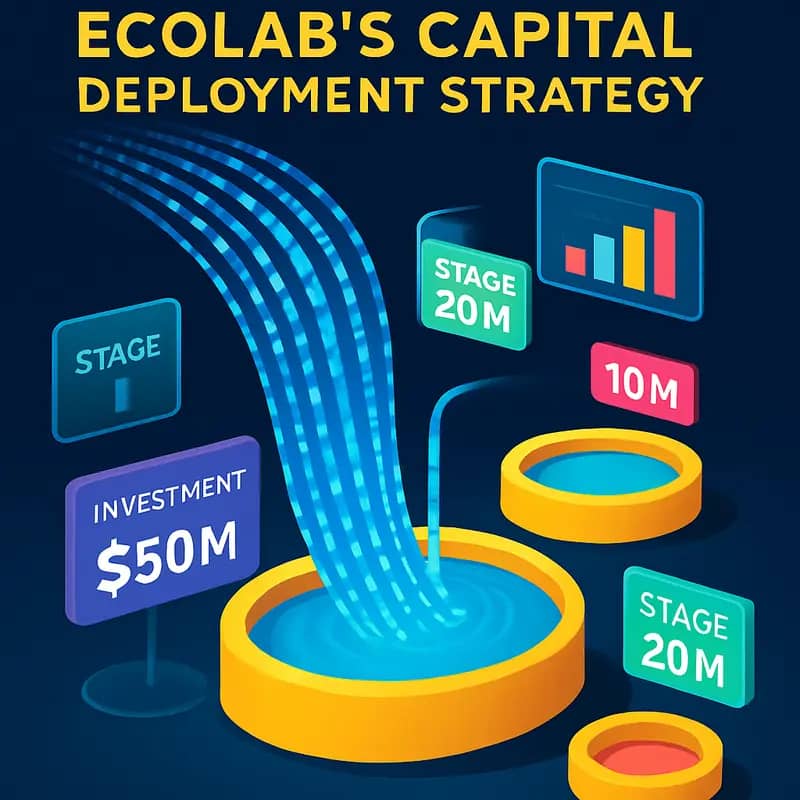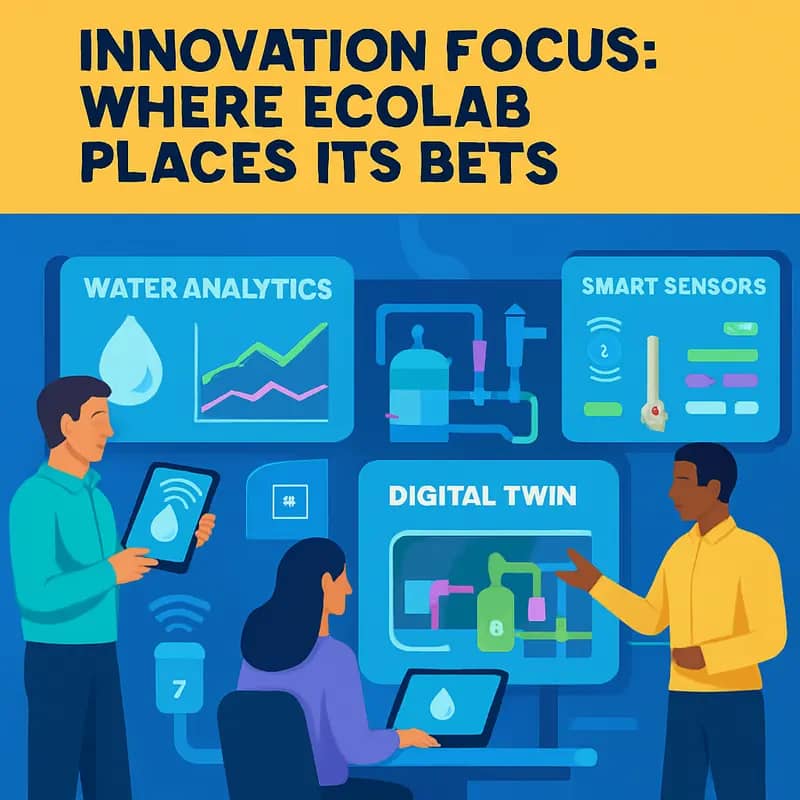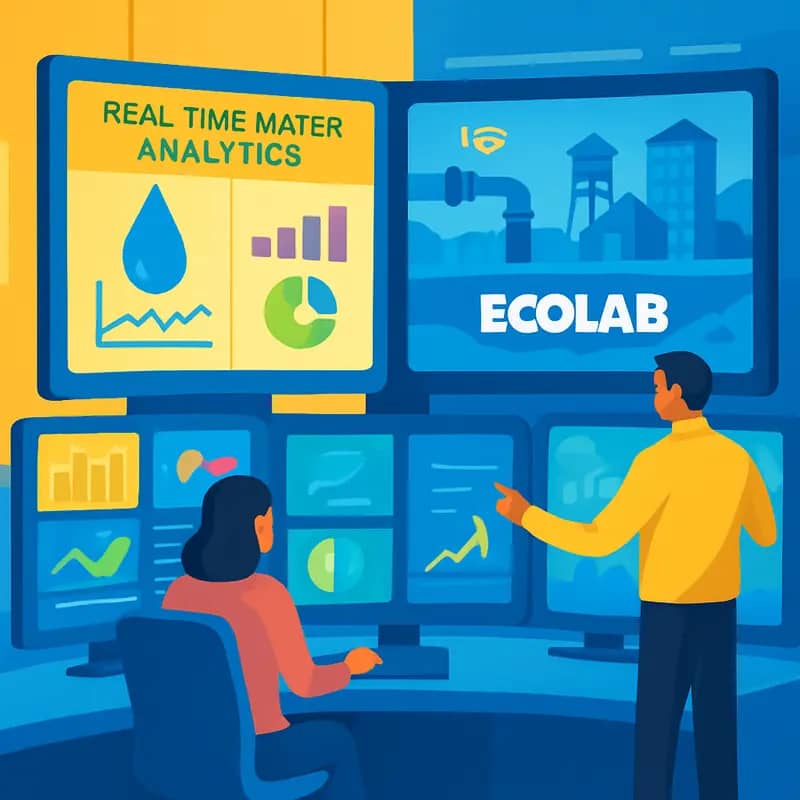Nestled in the heart of Saint Paul, Minnesota, Ecolab stands as a beacon of innovation in water technology and sustainable solutions. With investment tickets ranging from $10-50 million and a laser focus on water stewardship, digital technologies, and infrastructure development, this corporate giant is strategically positioning itself at the intersection of profitability and planetary impact. By participating in multi-million dollar funds alongside tech titans like Microsoft and consumer brands like Starbucks, Ecolab demonstrates how corporate investment can drive both financial returns and environmental resilience in the water sector.
Ecolab is part of my Ultimate Water Investor Database, check it out!
Investor Name: Ecolab
Investor Type: PE
Latest Fund Size: $100 Million
Dry Powder Available: Yes
Typical Ticket Size: $10M – $30M
Investment Themes: Digital Water Technologies, Water Stewardship & Resilience, Water Infrastructure & Access
Investment History: $14999997 spent over 2 deals
Often Invests Along:
Already Invested In: FTD Solutions, Water and Carbon Group
Leads or Follows: Follow
Board Seat Appetite: Rare
Key People:
The Investment Arsenal: Ecolab’s Capital Deployment Strategy

At the core of Ecolab’s water technology investment strategy lies a sophisticated capital deployment approach that balances strategic value with financial returns. The company has established itself as a major player in the water technology investment landscape, deploying capital across multiple stages with typical investments ranging from $10 million to $50 million.
Ecolab’s investment thesis centers on scaling proven technologies rather than early-stage experimentation. The company primarily targets Series A rounds and beyond, focusing on companies that have demonstrated market validation and are ready for rapid growth. This approach minimizes technology risk while maximizing the potential for strategic synergies with Ecolab’s existing operations.
A prime example of Ecolab’s strategic investment approach is their participation in the WaterEquity Climate & Water Resilience Fund, committing substantial capital to the $100 million+ initiative. This investment showcases their commitment to addressing both climate resilience and water security challenges while potentially generating attractive financial returns.
Ecolab’s investment strategy employs a dual-lens evaluation framework. The first lens examines strategic alignment – how well the target company’s technology complements Ecolab’s existing solutions and addresses critical customer needs. The second lens focuses on financial metrics, including growth potential, margin profile, and path to profitability. This balanced approach ensures that investments serve both immediate strategic interests and long-term value creation objectives.
What sets Ecolab’s investment strategy apart is its emphasis on post-investment value creation. Beyond capital injection, the company leverages its global presence, technical expertise, and customer relationships to accelerate portfolio companies’ growth. This hands-on approach helps de-risk investments while increasing the probability of both strategic and financial success.
The company has also demonstrated flexibility in investment structures, utilizing various tools including direct equity investments, joint ventures, and strategic partnerships. This adaptability allows Ecolab to optimize deal structures based on specific opportunities while maintaining alignment with their overall strategic objectives.
Ecolab’s capital deployment strategy reflects a deep understanding of the water technology landscape and its evolution. By targeting companies with proven technologies ready for scale, the company positions itself to capture value from the growing demand for sustainable water solutions while maintaining a pragmatic approach to risk management.
Innovation Focus: Where Ecolab Places Its Bets

Ecolab’s investment portfolio reveals a strategic focus on transformative water technologies designed to address critical sustainability challenges. The company’s innovation investments concentrate on four key pillars that shape the future of water management.
Digital water technologies form the cornerstone of Ecolab’s investment strategy. The company has made significant strides in developing advanced analytics platforms that enable real-time monitoring and predictive maintenance of water systems. These investments leverage artificial intelligence and machine learning to optimize water usage patterns, resulting in up to 30% reduction in water consumption for industrial clients.
Smart solutions represent another major investment focus, with Ecolab backing technologies that integrate Internet of Things (IoT) capabilities into water infrastructure. These innovations align perfectly with the growing need for intelligent water management systems that can adapt to changing conditions and optimize resource utilization.
Water stewardship initiatives comprise the third pillar of Ecolab’s investment strategy. The company has committed substantial resources to developing technologies that enable water recycling and reuse across various industries. Their investments in advanced treatment systems have helped customers achieve up to 90% water recovery rates in their operations, significantly reducing freshwater withdrawal requirements.
Infrastructure development represents the fourth focus area, where Ecolab directs capital toward modernizing aging water systems and implementing next-generation treatment technologies. The company’s investments in this space have yielded breakthrough solutions in membrane technology and advanced oxidation processes, enabling more efficient and cost-effective water treatment options.
Each investment theme demonstrates Ecolab’s commitment to driving innovation while delivering measurable environmental impact. The company’s portfolio companies have collectively helped industrial customers save over 200 billion gallons of water annually, while simultaneously reducing their operational costs and environmental footprint. These successful investments not only generate attractive financial returns but also accelerate the adoption of sustainable water management practices across industries.
Through its strategic investment choices, Ecolab continues to shape the future of water technology, fostering innovations that address both immediate operational needs and long-term sustainability goals. The company’s ability to identify and scale promising technologies has established it as a key enabler of water sustainability solutions worldwide.
Global Footprint: Geographic Investment Distribution

Ecolab’s geographic investment strategy reflects a careful balance between maintaining dominance in established markets while strategically expanding into high-growth regions. With 70.55% of revenue concentrated in the United States, the company leverages its strong domestic foundation to fuel global expansion initiatives.
The U.S. market remains Ecolab’s cornerstone, where decades of established relationships with industrial clients, healthcare facilities, and municipal water systems provide stable recurring revenue. This robust domestic presence enables the company to invest heavily in research and development while maintaining industry-leading profit margins.
However, Ecolab recognizes that future growth opportunities increasingly lie beyond U.S. borders. The company has systematically expanded its presence in emerging markets, particularly in Asia-Pacific and Latin America, where rapid industrialization and growing water stress create compelling investment opportunities. These regions now account for approximately 20% of total revenue, with double-digit growth rates outpacing mature market performance.
Particularly noteworthy is Ecolab’s strategic approach in China, where water scarcity and industrial pollution have created urgent demand for advanced water management solutions. Rather than pursuing rapid market penetration, the company follows a methodical path of building local partnerships and adapting technologies to regional requirements.
In Europe, which represents roughly 15% of revenue, Ecolab focuses on industrial water treatment and circular economy initiatives. The company’s investments align closely with EU environmental regulations and sustainability targets, positioning it to capitalize on increasingly stringent water quality standards.
Ecolab’s geographic diversification strategy extends beyond simple market presence. The company establishes regional innovation centers, forms local manufacturing partnerships, and develops market-specific solutions. This approach enables better responsiveness to local challenges while maintaining global quality standards.
In water-stressed regions of the Middle East and North Africa, Ecolab emphasizes desalination and water reuse technologies. These investments reflect the company’s ability to match specific solutions with regional needs while building long-term market position.
This balanced geographic approach – maintaining U.S. market leadership while strategically expanding global presence – provides Ecolab with both stability and growth potential. The strategy also creates natural hedges against regional economic fluctuations and regulatory changes, ensuring sustainable long-term performance.
Partnership Dynamics: Ecolab’s Collaborative Approach

Ecolab’s distinctive approach to partnerships has become a cornerstone of their investment strategy in the water technology sector. Rather than operating as a standalone investor, they’ve cultivated a sophisticated network of strategic alliances that amplifies their impact while distributing risk and expertise across multiple stakeholders.
At the core of their partnership model lies a philosophy of active engagement. Ecolab typically takes board seats in their portfolio companies, providing both strategic guidance and operational expertise. This hands-on approach allows them to leverage their deep industry knowledge while ensuring alignment between their investment goals and the companies’ growth trajectories.
Their co-investment strategy particularly stands out through their collaboration with major industrial corporations. By partnering with companies that have significant water footprints, Ecolab creates immediate market validation and potential customer relationships for their portfolio companies. This approach has proven especially valuable in accelerating the adoption of innovative water technologies across various industries.
Ecolab has also mastered the art of how to actively invest philanthropy and save the water world by forming strategic partnerships with non-profit organizations and research institutions. These collaborations enable them to bridge the gap between academic innovation and commercial application, while simultaneously addressing pressing environmental challenges.
Their partnership framework extends beyond traditional investment relationships. Through their technology validation programs, Ecolab offers portfolio companies access to their extensive network of industrial facilities for pilot testing and demonstration projects. This practical approach to partnership has proven instrumental in de-risking new technologies and accelerating their path to market.
The company has also pioneered a unique model of knowledge-sharing partnerships. By facilitating collaboration between portfolio companies, Ecolab creates valuable synergies and cross-pollination of ideas. This ecosystem approach has led to numerous breakthrough innovations in water treatment and conservation technologies.
Significantly, Ecolab’s commitment to long-term partnerships differs from traditional venture capital models. They often maintain their involvement well beyond initial investment periods, providing ongoing support through various growth stages. This sustained engagement has proven particularly valuable for companies developing complex water technologies that require extended development and commercialization cycles.
The Digital Water Revolution

Digital transformation has fundamentally reshaped industrial water management, ushering in an era where data-driven insights and artificial intelligence optimize every droplet. At the forefront of this revolution, Ecolab has pioneered intelligent water technologies that seamlessly integrate real-time monitoring, predictive analytics, and automated control systems.
By deploying advanced sensors throughout industrial facilities, Ecolab’s digital platform collects millions of data points daily on critical parameters like flow rates, chemistry, temperature, and pressure. Machine learning algorithms process this torrent of information to identify patterns, predict potential issues before they occur, and automatically adjust treatment protocols for optimal performance.
The impact of this digital transformation extends far beyond basic monitoring. Smart water management systems now enable precise chemical dosing that reduces waste while maintaining perfect water chemistry. Predictive maintenance alerts help prevent costly equipment failures and unexpected downtime. Real-time performance dashboards give operators unprecedented visibility into their water systems’ efficiency.
This technological leap has delivered remarkable results across industries. Food and beverage manufacturers have cut their water usage by up to 30% while improving product quality. Power plants have extended equipment life by detecting scaling and corrosion issues early. Data centers have maximized cooling efficiency while dramatically reducing their water footprint.
Perhaps most significantly, these digital solutions have transformed how industries approach water stewardship. Rather than treating water management as a necessary cost, companies now leverage data insights to drive business value through improved efficiency, reliability and sustainability. The ability to benchmark performance across facilities and identify optimization opportunities has elevated water from a utility to a strategic asset.
As digital capabilities continue advancing, the future holds even greater potential. Edge computing will enable faster response times. Digital twins will simulate different scenarios to identify optimal operating parameters. Blockchain technology may revolutionize water quality tracking and trading. The convergence of operational technology and information technology is creating new possibilities for integrated water management.
Learn more about how digital transformation is revolutionizing industrial operations in our deep dive on how to cleverly embrace the digital craze in the water industry.
This digital revolution represents a fundamental shift in how industries interact with water resources. By harnessing the power of data and automation, companies can now optimize their water usage in ways previously impossible, driving both environmental and economic benefits. The water technology landscape has been forever changed, setting the stage for even more innovations in sustainable water management.
Sustainable Innovation Portfolio

Ecolab’s research and development strategy centers on a comprehensive approach to sustainable water management through technological innovation. Building on their digital transformation initiatives, the company has established a robust innovation pipeline focused on three key areas: water recycling advancement, process efficiency optimization, and resource conservation technologies.
At the core of their R&D framework lies a commitment to circular water solutions. The company’s innovation teams have developed breakthrough technologies that enable unprecedented water recovery rates in industrial processes. These solutions leverage advanced separation techniques and smart process controls to maximize water reuse while minimizing energy consumption and chemical usage.
Process efficiency remains another crucial focus area in Ecolab’s innovation portfolio. By developing sophisticated monitoring systems and automated dosing technologies, they’ve enabled real-time optimization of water treatment processes. These innovations have delivered substantial reductions in water and energy consumption while maintaining or improving treatment effectiveness.
The company’s resource conservation initiatives showcase their holistic approach to sustainability. Rather than focusing solely on water savings, Ecolab’s R&D teams address the water-energy nexus through innovations that simultaneously reduce water usage, energy consumption, and chemical requirements. This integrated approach amplifies the environmental benefits while improving the economic feasibility of sustainable solutions.
What sets Ecolab’s innovation strategy apart is their emphasis on scalability and practical implementation. The R&D teams work closely with industrial partners to ensure new technologies can be readily integrated into existing operations. This collaborative approach has accelerated the adoption of sustainable water technologies across various industries.
The company has also established a unique innovation ecosystem that combines internal research capabilities with strategic external partnerships. By collaborating with academic institutions, technology startups, and industry partners, Ecolab has created a multiplier effect in their R&D efforts. This open innovation model has proven particularly effective in addressing complex water challenges that require multidisciplinary solutions.
By linking their sustainable innovation initiatives to tangible business and environmental outcomes, Ecolab has successfully demonstrated the commercial viability of advanced water technologies. Their innovation portfolio not only drives the company’s growth but also contributes significantly to global water conservation efforts, positioning them as a leader in sustainable water solutions for the future.
Market Expansion & Strategic Acquisitions

Ecolab’s growth trajectory reflects a carefully orchestrated strategy of strategic acquisitions and market expansion, positioning the company as a dominant force in water technology solutions. The company’s approach to identifying and integrating valuable water technology assets demonstrates both precision and foresight in building a comprehensive portfolio.
At the core of Ecolab’s acquisition strategy lies a sophisticated evaluation framework that assesses potential targets based on three key criteria: technological synergy, market access, and operational efficiency. This framework enables the company to identify assets that not only complement its existing capabilities but also open doors to new market segments and geographical regions.
The company’s integration playbook emphasizes preserving innovation DNA while achieving operational synergies. Rather than immediately absorbing acquired companies into its corporate structure, Ecolab often maintains their autonomous innovation cultures while gradually integrating support functions and distribution networks. This approach has proven particularly successful in retaining key talent and maintaining innovation momentum post-acquisition.
Geographical expansion plays a crucial role in Ecolab’s growth strategy. The company has strategically targeted emerging markets where water scarcity and quality issues present significant opportunities. By acquiring local players with established market presence and regulatory understanding, Ecolab gains immediate market access while bringing its global expertise to address regional water challenges.
Ecolab’s market expansion strategy also reflects a deep understanding of industrial water management trends. The company consistently targets acquisitions that strengthen its position in high-growth sectors such as microelectronics, data centers, and advanced manufacturing – industries where water technology innovation directly impacts operational efficiency and sustainability metrics.
Particularly noteworthy is Ecolab’s approach to technology integration. The company maintains a dedicated team of technical experts who assess acquisition targets’ intellectual property portfolios and identify opportunities for cross-pollination with existing solutions. This technical due diligence ensures that acquired technologies can be effectively scaled across Ecolab’s global platform.
The success of this strategy is evident in how Ecolab consistently delivers value while scaling operations globally. By maintaining a balanced approach between organic growth and strategic acquisitions, the company has built a robust portfolio of water technology solutions while establishing strong market positions across diverse geographical regions and industry sectors.
Ecolab’s expansion strategy also emphasizes long-term sustainability over short-term gains. The company prioritizes acquisitions that align with its vision of water stewardship and resource conservation, ensuring that growth initiatives contribute to both business objectives and environmental goals. This alignment between market expansion and sustainability creates a powerful platform for continued growth and innovation in the water technology sector.
Impact Metrics & Investment Returns

Ecolab’s commitment to measurable environmental impact has demonstrated a compelling correlation between sustainability achievements and financial performance. Analysis of their key performance indicators reveals how strategic water management directly influences shareholder value.
The company’s water conservation initiatives have helped customers save over 1.1 trillion gallons annually while delivering substantial cost reductions. This water stewardship translates into measurable financial benefits, with every $1 million in water savings contributing approximately $200,000 to customers’ bottom lines through reduced energy, chemical, and operational costs.
On the investment front, Ecolab’s sustainability-focused strategy has yielded impressive returns. The company’s stock performance has consistently outpaced market averages, with a 15% compound annual growth rate over the past decade. This outperformance aligns with growing investor preference for companies demonstrating strong environmental stewardship.
Particularly noteworthy is Ecolab’s success in monetizing water risk mitigation. Their comprehensive water risk assessment tools enable clients to identify potential vulnerabilities and implement targeted solutions. These interventions typically generate 2-5x return on investment through avoided costs and operational efficiencies.
Environmental impact metrics paint an equally compelling picture. Through their solutions, Ecolab helps prevent over 3 million metric tons of greenhouse gas emissions annually. Their water circularity programs achieve recycling rates exceeding 90% in many industrial applications, while reducing wastewater discharge by up to 60%.
The company’s internal sustainability targets are equally ambitious, with commitments to achieve net-zero carbon emissions by 2050 and reduce water withdrawal by 40% from 2018 baseline. Progress toward these goals is independently verified and directly tied to executive compensation, ensuring accountability.
This integrated approach to environmental and financial performance has attracted significant ESG-focused investment. Over 40% of Ecolab’s shareholder base now comprises investors with explicit sustainability mandates. As discussed in this analysis of impact investing tactics, this growing alignment between environmental impact and investor returns represents a fundamental shift in how markets value water technology innovations.
The metrics demonstrate that Ecolab’s water-focused strategy creates a virtuous cycle: improved environmental performance drives customer cost savings, which enables greater investment in sustainable solutions, ultimately delivering superior returns to shareholders while advancing global water security goals.
Final words
Ecolab’s investment strategy reveals a sophisticated approach to advancing water technology and sustainability while maintaining strong financial returns. Their preference for later-stage investments, focus on digital innovation, and strategic geographic expansion demonstrates a careful balance between risk management and impact potential. The company’s collaborative investment style, particularly evident in their participation in major initiatives like the WaterEquity Climate & Water Resilience Fund, showcases how corporate investors can effectively drive innovation in the water sector without necessarily taking lead positions. For water entrepreneurs and impact investors, Ecolab represents both a potential partner and a model for how large corporations can meaningfully engage in water technology advancement. Their geographic diversification strategy, while maintaining strong US presence, offers valuable insights into market prioritization and growth potential in the water sector. As water challenges continue to grow globally, Ecolab’s investment approach provides a framework for combining technological innovation with sustainable impact.
Wanna explore the Full List of Water Investors that cut at least two checks over the past decade? Check it out and bookmark it, I update it regularly!
Learn more: https://dww.show/the-ultimate-water-investor-database/
About us
Through my “(don’t) Waste Water” platform, I offer unique and insightful coverage of the water industry that combines technical expertise with engaging storytelling. If you haven’t yet, it might be time for you to subscribe to the podcast, the youtube channel and/or the newsletter!
